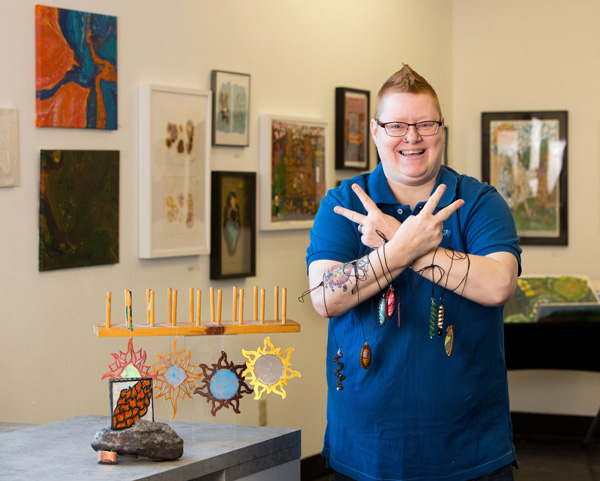 A guest blog post by Bart S Bartholomew, artist:
A guest blog post by Bart S Bartholomew, artist:
I was supposed to be twins.
I’m old enough to be born at a time when expectant parents didn’t get 3D images of their child/children every month throughout a pregnancy. The doctor did the best he could, and my parents were told to prepare for twins. They got ready for the day, chose names, and even had two of many things new babies need.
When I arrived alone on delivery day, it was a shock to them all. In fact, my parents were so surprised that I spent the first week as “baby girl”, and it was their plan to take me home from the hospital that way. The day before we were being discharged, my dad was at home baking a cake. He had a special recipe that used sherry wine, and he thought “Sherry” had a nice ring to it. Mom liked it too, and that’s how I got my name.
Growing up I was the proverbial “black sheep” of the family. I knew I was different; I didn’t know what “different” meant, other than that it made me feel lonely and ashamed. Their expectations and those of our small community weren’t my priorities. I had no interest in being feminine or wearing dresses and make-up. With each passing year my name became more uncomfortable, more unbearable – like a scratchy woolen sweater or the dresses I was forced to wear. I complied to keep the peace, but I lost a part of me each time I did.
True change happened unexpectedly at a potluck when a new friend asked me one simple question: “so, are you a lesbian?” We were grilling salmon steaks, and I was so flabbergasted that I didn’t know what to say. So, I went with honesty and replied, “I have no clue.” She smiled, shrugged, flipped the salmon steaks, and said, “Fair enough.”
The thought had probably rattled around in my brain before, but this truly was the first positive acknowledgement and acceptance of my difference.
When I got into culinary school, the story of how I was named eased the uncomfortable feeling of my identity. “No wonder you’re a chef. You were named while your dad was baking!” In a kitchen, there wasn’t the added pressure of being girlie; we were all identical, androgynous workers. Everyone was dressed in the same uniform: white toque, white chef’s coat, black checkered pants, and black shoes. The mantle of my given name didn’t feel nearly as tight or suffocating. This may seem weird, but not having to worry about how I dressed or what I looked like gave me the freedom to explore and start the process of becoming authentically me. I finally felt like I’d found a community of like-minded people where I was welcomed.
Then as life often does, it threw me a curveball. The career I loved so much broke me into a million pieces. Having a non-apparent disability worked against me every step of the way. The community I had felt a part of, those people I bonded with and suffered long hours with in a kitchen, judged me for needing time away. “You look fine” is what I heard repeatedly. My difference was once again so glaring and alienating.
After hospital stays and outpatient services, I drifted until I found a new community—one that understood me on a much different and deeper level. We say “werk with your quirk”, and that resonated in my soul. It wasn’t until I started creating art that I found my voice. I began building a vocabulary that included words, pictures, and pieces of my soul.
Without even thinking, I signed a piece of art as Bart. From there, I started signing all my work that way. Bart. It is part of my last name, and that felt true to who I was as an individual and human being. More so than Sherry ever did. And in that moment, all those years of wearing that scratchy woolen sweater and those awful dresses were being peeled away. I was coming home not as “baby girl” or as “Sherry” but as Bart and who I was meant to be all along.
I had hoped that our world would learn to accept and appreciate differences by now, but intolerance and prejudice seem to still be the standard. It is especially true for those of us who deviate from societal norms. If we try to blend in, we feel lost and forgotten. If we live our lives authentically, we’re stigmatized, demonized, and cast aside.
I am non-binary, non-neurotypical, with non-apparent disabilities. This puts me in the crosshairs of discrimination. It’s a constant struggle to be seen, heard, and recognized.
But having all of these “non” parts doesn’t and shouldn’t make me anonymous. Because I am also an artist, a dog-lover, a mixed martial arts enthusiast, and a partner who has been married to the same woman for almost 20 years. I still love to cook and bake—now as Bart. All of those “non” pieces of me mixed in with other parts helped get me here—to a community I love who loves me in return as Bart.
During this month of Pride celebrations, let’s not allow hatred to silence us. Those differences I was afraid of for so long are what make us powerful and stronger together.
To those who are struggling, I see you. You are wonderfully unique and incredibly courageous. And most importantly, you are not anonymous.